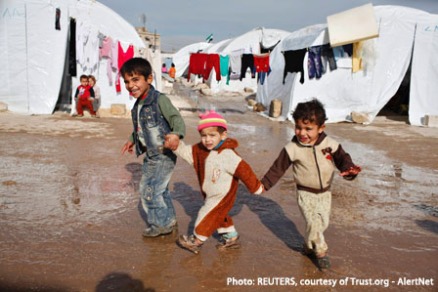Today an event was held which highlighted how environmental sustainability is an integral part in humanitarian aid effectiveness. The panelists in this meeting discussed the findings from a report entitled “Environment and Humanitarian Action: Increasing Effectiveness, Sustainability, and Accountability.”
The first speaker, Ms. Gebremedhin, the Director of Humanitarian Assistance and Foreign Affairs of Finland, began by addressing various environmental issues that need to be taken into account during humanitarian action, in order for it to reach its full potential. For example, management of solid wastes and hazardous materials and safeguarding natural resources are essential, and the reduction of deforestation, desertification, and pollution is necessary for sustained livelihoods in the aftermath of a disaster. Furthermore, efficient leadership and accountability are needed in humanitarian situations, and addressing environmental concerns is a shared responsibility between donors and humanitarian organisations.
Following, Mr. Khalikov, Director of OCHA Geneva, stated the effectiveness of humanitarian aid is dependent on environmental conditions. He cited floods and draughts as main environmental threats that can complicate an already existing humanitarian crisis, like a famine or armed conflict.
Ms. Anita van Breda from WWF USA spoke about combining climate change adaptation strategies with disaster risk reduction. She highlighted the Green Recovery Program – a partnership between WWF and the American Red Cross –, which works to sustain livelihoods, provide adequate water, sanitation, and shelter, and deals with disaster management. Her three key recommendations to take the environment into consideration when taking humanitarian action included: updating academic training and professional development, learning to manage change and developing new ways of learning, and ensuring that staff and volunteers have the necessary discipline, skills, and aptitude.
Concluding the meeting Ms. Costa, the Executive Director of the Women’s Refugee Commission spoke about the threat faced by women and girls when they have to leave their refugee camps to collect firewood for cooking and heating. Many have to travel 5 or 6 hours a day to collect enough wood to cook just one meal, and on the journey are raped, beaten, or killed. Ms. Costa emphasised the importance of shifting communities away from dependence on wood fuel and towards more environmentally friendly and sustainable options in order to decrease the threat of this gender based violence and to reduce deforestation and resource overconsumption.
Meeting Title: Environment and Humanitarian Action: Increasing Effectiveness, Sustainability, and Accountability
Speakers: Ms. Anna Gebremedhin, Director of Humanitarian Assistance and Foreign Affairs of Finland; Mr. Rashid Khalikov, Director of the Office for Coordination of Humanitarian Affairs (OCHA), Geneva; MS. Anita van Breda, Director of Humanitarian Partnerships, WWF USA; Ms. Sarah Costa, Executive Director of Women’s Refugee Commission
Location: Conference Room 5 NLB, United Nations HQ, New York
Date: 23 June 2014
Written by WIT Representative: Marli Kasdan
Edited by WIT Representative: Sophia Griffiths-Mark

